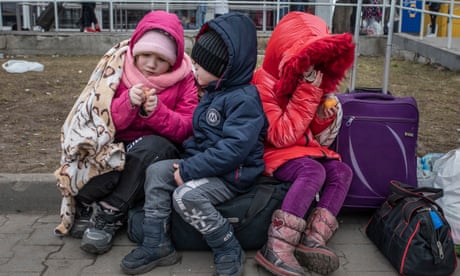- by foxnews
- 08 Apr 2025
‘I left everything’: Tens of thousands of Ukrainians seek safety in neighbouring Poland
‘I left everything’: Tens of thousands of Ukrainians seek safety in neighbouring Poland
- by theguardian
- 01 Mar 2022
- in news

The village of Medyka in south-eastern Poland is the main border crossing with Ukraine. Thousands of refugees have crossed the border by bus, car and on foot. They are mostly women and children. After Kyiv decreed a full military mobilisation, Ukrainian men aged 18-60 are forbidden to leave the country.
"I came here with my sisters, my mother and my grandmother," Arina, 21, from Vinnitsya, told the Guardian. "My father stayed in Ukraine and we think about him all the time. It was a difficult journey to reach Poland and we don't know what the future holds. But we are not alone. We are holdings hands with each other.''
Arina says that until a few weeks ago, the possibility of finding herself in a war was as distant as in any other European country. Today, she and tens of thousands of fellow Ukrainians have been forced to leave their homes, their loved ones, their cities and their country, which is at risk of belonging to someone else soon.
"I left everything in Ukraine," says Inna, 49, from Kharkiv, the country's second largest city where Ukrainian forces have regained control after days of fighting. "My husband is fighting against the Russians. I have just arrived here, completely alone, with my three daughters. I do not know where to go."
More than half a million people have fled Ukraine in the last four days, Filippo Grandi, the UN high commissioner for refugees (UNHCR) said on Monday. On Sunday, over 45,000 people arrived in Poland in just 15 hours. According to the UN, up to 5 million people could flee abroad if the war continues, surpassing the 1.3 million asylum seekers from Syria, Iraq, Afghanistan and Africa fleeing poverty and wars in 2015, which, by now, is Europe's largest wave of refugees since the second world war.
The mass exodus is causing severe queues at the Poland-Ukraine border, with rows of people and cars reaching 14 km long and waiting times of 40 hours, according to a UNHCR spokesperson, Chris Melzer.
"I come from Lviv," says Natalia, 33, who arrived in Poland this morning with her two daughters. "Generally, in normal times it would have taken me two hours by car to reach Poland, but it took me almost three days to get here.''
According to some sources on the Ukrainian side of the border, the waiting times are caused by the processing procedure of Ukrainian authorities, who are determined to check every person who leaves the country.
Women arriving on the Polish side of the border tell of children forced to stand waiting all day, in the cold, to cross the border with their families.
Once on Polish territory, the Ukrainians are transferred to reception facilities, hostels, dormitories and sports facilities.
Along with Ukrainian refugees, there are also groups of people from Pakistan, Ghana, Morocco and Somalia. Many of them are students, others are workers and still others are asylum seekers.
Their fate is uncertain. It is unclear whether the Polish authorities will allow them to stay. Some would like to go back to their country. Others fear they will be sent back.
"I arrived in Ukraine last December," says Philippa, 24, from Ghana. "I had a great time there and I pray that my Ukrainian friends are fine. I don't know what we're going to do. They told us we can stay here for 15 days and then eventually renew our request to stay. But we still don't know exactly what will happen in the end."
Rights groups have welcomed the efforts by Poland to help, but some drew comparisons with the treatment of other refugees from Syria, Afghanistan and Kurdish Iraqis in the country, where its populist rightwing government has often played on anti-refugee sentiments.
Last year, after the Belarusian president, Alexander Lukashenko, organised the movement of refugees with the promise of a safe passage to Europe, thousands of people from the Middle East were caught by Polish border guards in the forests near the border and illegally and violently pushed back to Belarus.
"We can't stand by and watch,'' Sasha, 57, told the Guardian. "We are going back to Ukraine. To our home. We are going to fight."
- by foxnews
- descember 09, 2016
Ancient settlement reveals remains of 1,800-year-old dog, baffling experts: 'Preserved quite well'
Archaeologists have recently unearthed the remarkably well-preserved remains of a dog from ancient Rome, shedding light on the widespread practice of ritual sacrifice in antiquity.
read more


